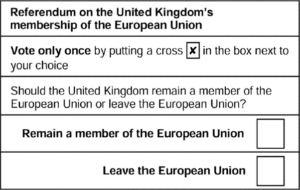 This post might annoy you. It might annoy you because I’m not going to give you a simple “how I think you should vote” piece, even though you’re probably sick to your back teeth of such pieces.
This post might annoy you. It might annoy you because I’m not going to give you a simple “how I think you should vote” piece, even though you’re probably sick to your back teeth of such pieces.
This referendum has been marked as much by questions of who to trust as it has on any matter of substance, and I know – both from anecdotal experience and from polling – that academics are seen as relatively trust-worthy and non-partisan. Those of you who have read this blog over the years will know that I’m generally under-whelmed by the standard of debate on the EU and that I’ve never been obviously convinced by either side’s argument in this campaign. Hence, I think it’s more important that you think about how you will vote than how you vote, certainly in the long term.
And that’s my starting point. The future.
Neither side in the referendum has talked about the future, except in the vague terms of how it’ll be wonderful (or terrible) if only we vote with them (or against them). That’s not a plan, that’s just blah.
Now I understand that everyone wants to win the referendum, but I’m much less clear about why they want to win. In particular, I don’t know what they want the UK to look like, to be like.
This is something that bothered me a long time before this vote was even called, and the campaigning has done nothing to assuage me on this. If we don’t know what kind of society that we want to build, then how can we start making decisions about how to build it?
It’s terrible that it has taken the killing of Jo Cox to bring such questions more to the foreground of debate, but that only strengthens my resolve that we should think on such matters as we make our choices.
However, this brings us to a second key point of reflection, on the present.
In many ways, this referendum has turned into something like a general election, where each side is saying things that voters might think they will be getting if only you choose their option.
This is patently untrue. The government does not stand or fall on this vote, even if certain individuals might be phoning around for a man with a van to help with removals.
When you vote, you would do very well to reflect on how either side can actually follow through on their promises and ‘commitments’. Cameron can give you his new settlement with the EU, but he can’t guarantee future reform of the EU. Leave can’t guarantee anything, be that on controlling immigration, signing new trade deals or getting the EU to give us a good deal.
That’s a pretty depressing way of looking at it, but it’s a more realistic one than saying the opposite. if we should remember one thing, then it’s that politics is very difficult, because no one is in full control of the situation and everyone has to make compromises. That’s on purpose, by the way, so that we don’t suffer the whims of any one politician.
And politicians are the last thing I’ll be thinking about, in both senses.
This referendum is a big thing. It’s something that will affect your life not just this week, or this month, but for decades to come. It really does matter, whether we stay in or not.
That also means that how you feel about any of the people trying to sell their arguments to you is largely irrelevant. It’s irrelevant not only because of the problem I outlined above (that they might not have the power to do what they say), but it’s also irrelevant because this is such a big thing that they can never have the power to do what they say, either in terms of the scope of the issue or in terms of its duration.
That means I’m thinking about the issues, not the personalities. The issues will remain, long after the politicians have gone.
Which brings us back to where we started. To you.
Democracy is hard. Democracy is hard, because it keeps asking something of you, and me, and everyone else. It keeps asking us to make choices, day after day, year after year.
It does that because the alternative is that someone else will make decisions for us.
I’m happy to admit that I have never thought that a referendum was the right way to address the issue of the UK’s membership of the EU, but that’s what’s happening.
It means that you have to make a choice and then to live with it.
I can only encourage you to go out and vote and make your voice heard, because if you don’t then you’re not going to have a better opportunity. Turning your back is not an option here, because this will affect you.
But I’m also going to encourage you to keep on taking part, to keep on making your voice heard. If you don’t like the tone or content of political debate, then change it, by speaking out, by demanding your democratic rights. Thursday is an important day, but it’s not the only important day: democracy without participation by the people is empty and we should always remember that.
